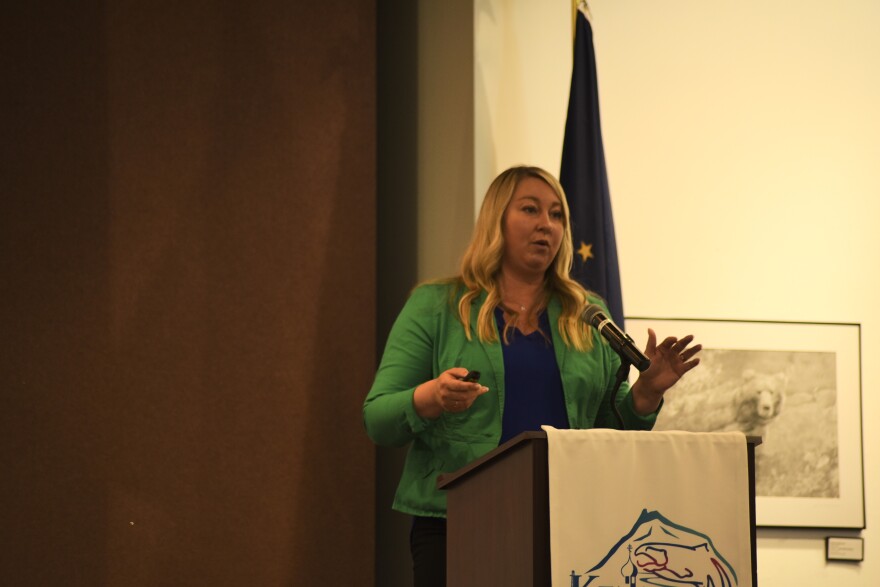This fall, Alaskans will vote on yet another sharply divisive ballot initiative about the state’s tax structure on oil production.
Ballot measure one, commonly known as Alaska’s Fair Share, would increase taxes on oil companies that produce at least 40,000 barrels of oil per day and more than 400 million barrels total north of 68 degrees latitude—which is north of the Arctic circle. The sponsors say it’s targeting the largest producers on the North Slope and reverses some of the changes made in 2014 under Senate Bill 21, which added tax credits and aimed to draw additional exploration and investment in Alaska.
Opponents say it would strangle an oil industry that’s already had a rough year due to record-low prices on top of the ongoing coronavirus pandemic. Jill Schaefer, a co-chair of the OneAlaska campaign opposing the ballot initiative, told a small crowd of attendees at the first Kenai-Soldotna chamber luncheon in months that oil and gas companies already pay plenty of taxes, now is not the time for a major increase in taxes amid all the challenges.
"The initiative is called the Fair Share Act, and yeah, it’s a great name with horrible consequences," she said. "So, the important thing is that we have to get the information out, and a lot of those people aren’t reached unless it’s by a neighbor or friend saying, ‘Hey, the Fair Share Act is not fair.'"
Alaska is heavily dependent on the oil industry. Without any broad-based taxes, nearly all of the state’s budget has historically come from oil production taxes, while the state’s savings in the Permanent Fund are also funded by royalties. A McDowell Group study completed for the Alaska Oil and Gas Association released in January cites about 12,305 jobs in the oil and gas sector in 2018, and 41,811 jobs when indirect and induced jobs are included.
Schaefer said increasing Alaska’s taxes on oil would make the state less competitive on the world stage.
"If the initiative was passed, we would be at the very top of the states for government take," she said. "What that means that companies looking to invest or explore makes Alaska really not attractive."
She urged people to vote no on the proposition and to seek out more information. Most of the co-chairs for the campaign, OneAlaska, are from the Anchorage area, though a handful are from other regions including Utqiagvik, Fairbanks, and Ketchikan; Schaefer lives in Soldotna. She says they also range across the political spectrum, and that’s in part because the oil industry does affect so many people in so many areas of the state.
"So for me, this campaign really represents all of Alaskans and it is bringing them together," she said. "It is so important to me that this initiative doesn’t pass."
The OneAlaska campaign so far has raised more than $6 million, with the largest amounts from ConocoPhillips, ExxonMobil, Hilcorp Energy, and BP.
Backers of the ballot initiative reported that the Fair Share campaign raised nearly a quarter-million dollars in contributions in the second quarter of 2020. That brings the total amount raised by Alaska’s Fair Share to $664,330 from 393 individual Alaskans, according to David Dunsmore, the organization’s campaign manager.
Of course, those opponents have deep pockets, and Dunsmore is under no illusion that those opposed to the initiative, also known as Ballot Measure 1, will not outspend Alaska’s Fair Share.
“The other side is still going to outspend us significantly,” Dunsmore said. “But, as we've seen in the past, they got less bang for the buck because they're not organic.”
Dunsmore says Senate Bill 21 heralded a decline in jobs and the state’s current recession.
“You know, it's really important that we do this now. These are tough times for Alaskans,” Dunsmore said. “SB- 21 has just shown to be a job killer. It's killed jobs all across the state, forced Alaska into a recession, and now we have the opportunity to take action and fix it.”
The financial report for both campaigns can be found on the State’s Alaska Public Offices Commission website.
Editor's note: This article has been updated to correct that the deposits into the state's Permanent Fund come from mineral royalties.
Reach Elizabeth Earl at eearl@kdll.org.




